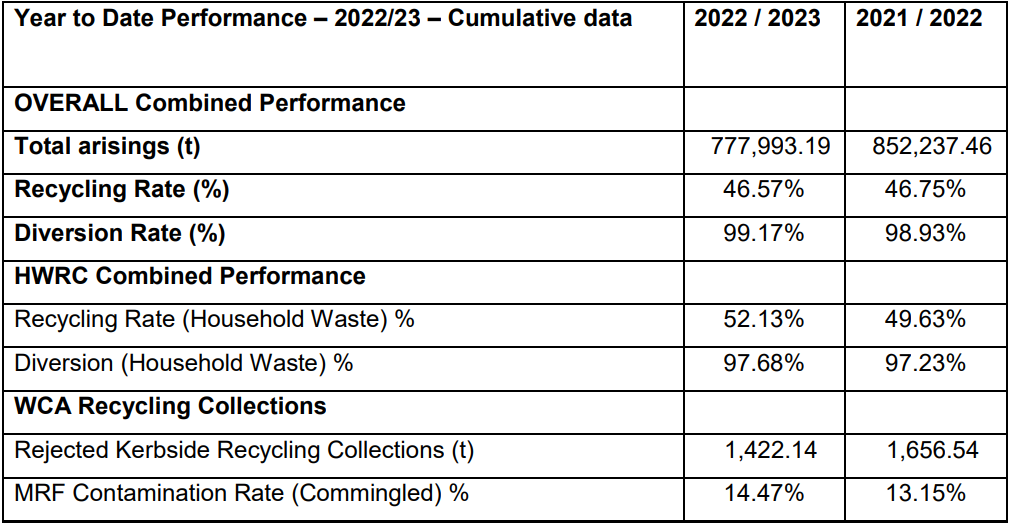The reductions were covered in a report to go before the Greater Manchester Combined Authority this week (15 March) which notes a reduction in April to December 2022 of 74,000 tonnes to 777,993 tonnes, a 9% drop.
Alongside the fall in overall volumes, recycling levels in percentage terms were almost static at 46.57% compared to 46.75% in 2021, although MRF contamination rose slightly to 14.47%.
The update on contracts was written by Justin Lomax, head of contract services at GMCA’s waste and resources team and Paul Morgan, the waste and resources team’s head of commercial services.
The report provides an update on the performance of the two contracts held by Suez since 1 June 2019 using cumulative annual data for the period between April to December 2022.
The document compared total waste arisings, landfill diversion, overall recycling rate, contamination levels, tonnage rates for the period with the same time frame in 2021/22.
In terms of paper contamination, 1,422 tonnes of paper and card were rejected at the kerbside, down from 1,656 the previous period. The report noted improvement, but said that ongoing measures are required to “encourage accurate recycling by residents”.
Waste strategy
The committee also received a waste strategy update, written by Paul Morgan. The document aimed to update the committee on recent developments on the implementation of the Resources and Waste Strategy.
It considered the deposit return scheme (DRS), extended producer responsibility (EPR) for packaging as well as the consistency of collection for recycling.
The document highlighted that the Department for the Environment, Food and Rural Affairs (Defra) has taken the approach of looking at each area separately, meaning there is still “no complete picture on the impacts or how each element of the strategy interacts on others”.
The report… also pointed out the need to consider the future of the authority’s existing contracts with Suez
It also pointed out the need to consider the future of the authority’s existing contracts with Suez, the initial term of which will expire in 2026. The decision on whether to extend or return to market needs to be made by the end of 2023, the document said.
Looking at the implications of DRS, the waste strategy update warned of the diversion of plastic bottles and metal drinks containers from kerbside. This is likely to reduce income for Suez, which may result in a ‘change in law’ claim under which the contractor can claim the increased cost of performing its obligations.
It also touched on the TEEP test, which “is particularly important in the consideration of food waste collections”. The TEEP test determines whether it is ‘technically, environmentally and economically practicable’ for a local authority to adhere to the incoming waste legislation.
The document outlined that little information has been provided so far and it is understood that the rules on TEEP are “several months away” and “this is deeply frustrating”. Lack of clarity on this was also brought up as an issue at letsrecycle.com’s National Food Waste Conference last week (see letsrecycle.com story).
MRF modification
Other complications related to the waste legislation included the requirement to modify the authority’s MRF for additional infrared processing equipment once plastic pots, tubs, trays and soft plastics are added to collections. The report said this is estimated to come with a capital cost of between £15-20 million. Additionally, the need to collect soft plastic separately at the kerbside “to prevent them from causing mechanical issues at the MRF” will result in the need for more vehicles.
The document referenced a Defra statement from the 1 February, which stated that ‘new burdens’ funding for the introduction of new services will be based on a “yet-to-be determined funding formula”. It concluded that next steps include continued engagement with the department on food waste, EPR, new burdens, consistency and TEEP.













Subscribe for free